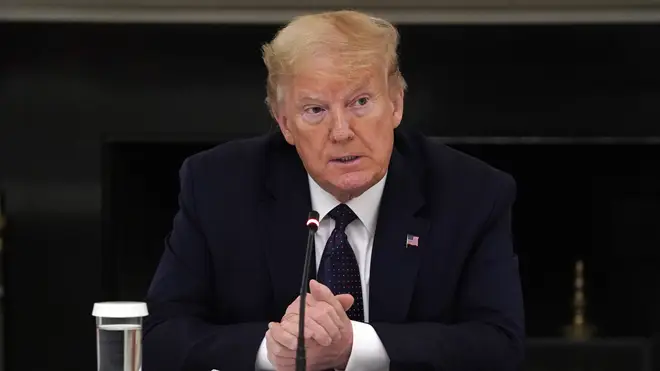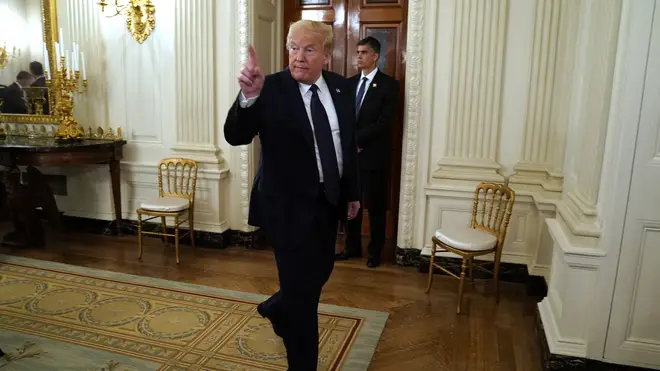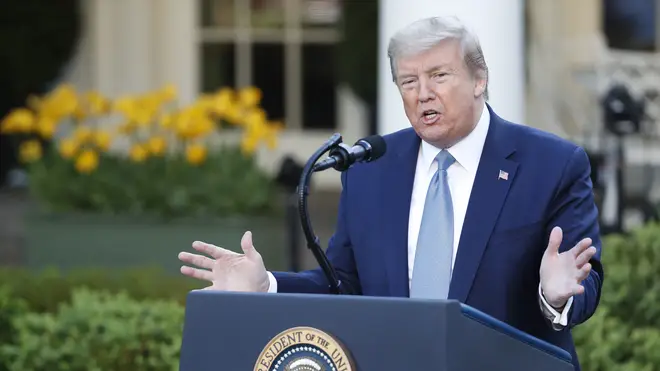
Simon Marks 4pm - 7pm
18 May 2020, 21:42

Donald Trump reveals he has been taking hydroxychloroquine
US President Donald Trump has revealed he is taking the unproven malaria drug hydroxychloroquine as a prophylactic against coronavirus.
When questioned why he was taking the drug, Trump said he'd been taking it for a week and a half and added: "I think it's good, I've heard a lot of good stories."
Speaking at the White House on Monday, Trump told reporters: "I happen to be taking it.
“A lot of good things have come out. You’d be surprised at how many people are taking it, especially the front-line workers. Before you catch it. The front-line workers, many, many are taking it.”

He also said that his own doctor had not recommended the drug, but that he had requested it from the White House doctor.
Trump also clarified that he has tested negative for the virus.
House Speaker Nancy Pelosi told CNN: “He's our president and I would rather he not be taking something that has not been approved by the scientists.
“Especially in his age group and in his, shall we say, weight group, what is morbidly obese, they say. So, I think that it's not a good idea.”

Hydroxychloroquine has not been proven to have any effect on Covid-19 in any clinical trial, and last week the FDA cautioned against using the drug outside of a hospital setting or a clinical trial, warning it can cause "serious heart rhythm problems" in patients who are also suffering with the virus.
Some patients died after taking the drug.
But Trump dismissed reports of side effects, saying: "All I can tell you is, so far I seem to be OK."
But despite warnings from doctors, Trump has long-touted the anti-malaria drug as a cure for Covid-19 and ordered his administration to stockpile it earlier in the year.
Trump also claimed he had no financial ties to the company who manufacture the drug, when asked about why he was continuing to push for its use in the US.
Trials involving the drug being used to treat coronavirus patients were abandoned in New York earlier this month as the drug had negative effects on people's hearts.
Two large observational studies, each involving around 1,400 patients in New York, recently found no benefit from hydroxychloroquine. Two new ones published on Thursday in the medical journal BMJ reached the same conclusion.

One, by French researchers, gave 84 hospital patients the drug and 97 others the usual care. There were no differences in the odds of death, need for intensive care or developing severe illness.
The other study from China was a stricter test: 150 adults in hospital with mild or moderate illness were randomly assigned to receive hydroxychloroquine or usual care. The drug made no difference in rates of clearing the virus or time to relief of symptoms, and they brought more side effects.
In April, the National Institutes of Health launched a study testing hydroxychloroquine versus a placebo drug in 500 Covid-19 patients.
Last week, NIH announced another study to see if hydroxychloroquine plus azithromycin can prevent hospital admission or death in people with mild to moderate illness.
Listen & subscribe: Global Player | Apple Podcasts | Google Podcasts | Spotify
About 2,000 US adults with confirmed coronavirus infections and symptoms such as fever, cough or shortness of breath will receive the drugs or placebo pills.
At least two White House employees tested positive for Covid-19 earlier this month, sparking concerns about steps taken by the administration to protect the president and sending vice president Mike Pence and other officials into varying forms of self-isolation.
The White House has since mandated that those in the West Wing wear face coverings and has introduced daily testing for the president, vice president and those they come in close contact with.
Mr Trump had an "interim" check-up in a November visit to Walter Reed National Military Medical Centre that was not noted on his public schedule. His last complete physical was in February 2019.
Donald Trump has come under fire for his medical suggestions in recent weeks, most notoriously for suggesting people could inject disinfectant to treat Covid-19.